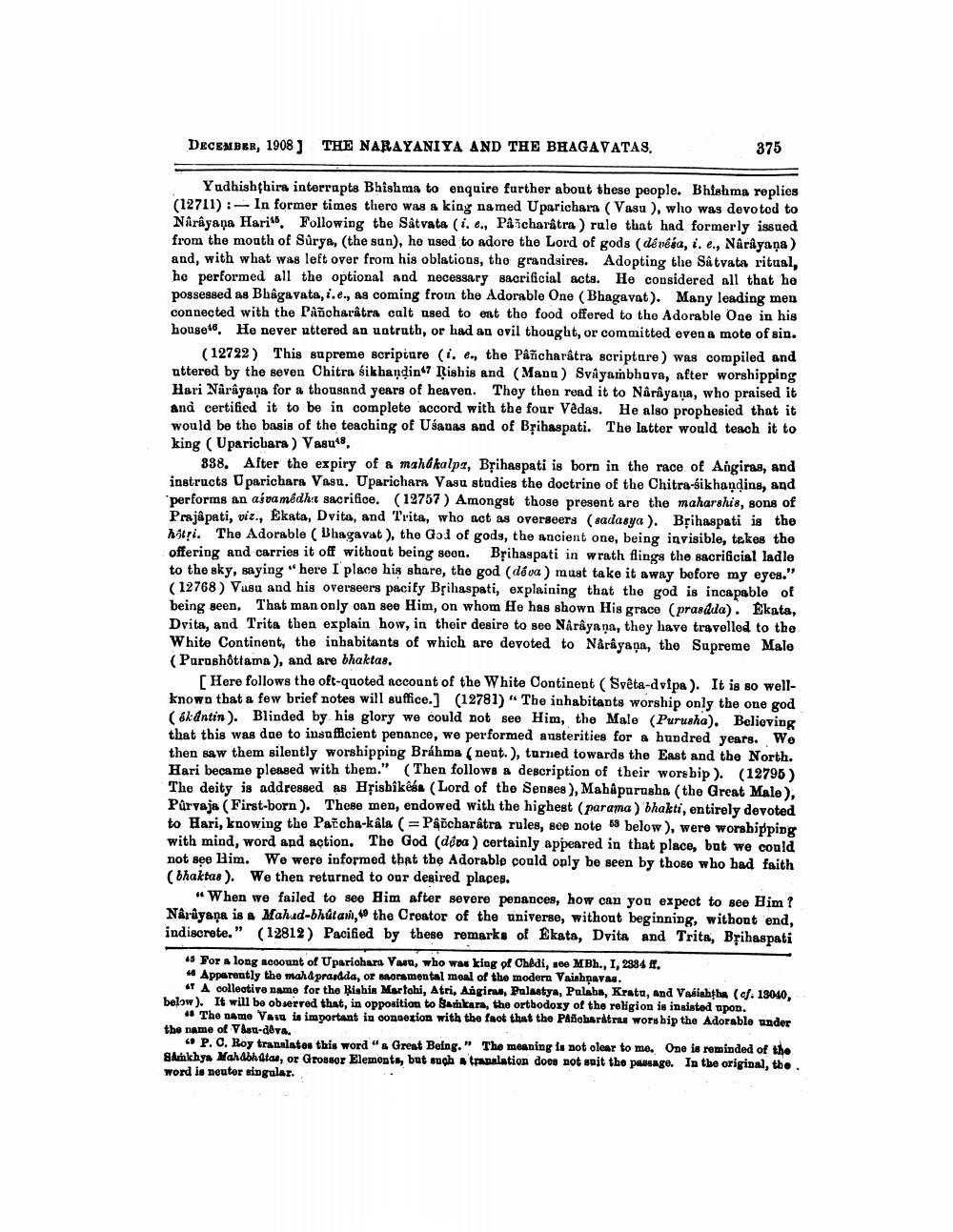________________
DECEMBER, 1908] THE NARAYANIYA AND THE BHAGAVATAS.
Yudhishthira interrupts Bhishma to enquire further about these people. Bhishma replies (12711): In former times there was a king named Uparichara (Vasu ), who was devoted to Narayana Hari. Following the Sâtvata (i. e., Paicharâtra) rule that had formerly issued from the mouth of Surya, (the sun), he used to adore the Lord of gods (dévésa, i. e., Nârâyaṇa) and, with what was left over from his oblations, the grandsires. Adopting the Sâtvata ritual, he performed all the optional and necessary sacrificial acts. He considered all that he possessed as Bhagavata, i.e., as coming from the Adorable One (Bhagavat). Many leading men connected with the Pâñcharâtra calt used to eat the food offered to the Adorable One in his house. He never uttered an untruth, or had an ovil thought, or committed even a mote of sin.
375
(12722) This supreme scripture (i. e., the Pâñcharâtra scripture) was compiled and uttered by the seven Chitra sikhandin7 Rishis and (Manu) Svayambhuva, after worshipping Hari Narayana for a thousand years of heaven. They then read it to Nârâyana, who praised it and certified it to be in complete accord with the four Vêdas. He also prophesied that it would be the basis of the teaching of Usanas and of Brihaspati. The latter would teach it to king (Uparichara) Vasu18,
838. After the expiry of a mahakalpa, Brihaspati is born in the race of Angiras, and instructs Uparichara Vasu. Uparichara Vasu studies the doctrine of the Chitra-sikhandins, and performs an aśvamédha sacrifice. (12757) Amongst those present are the maharshis, sons of Prajapati, viz., Ekata, Dvita, and Trita, who act as overseers (sadasya). Brihaspati is the hatri. The Adorable ( Bhagavat), the God of gods, the ancient one, being invisible, takes the offering and carries it off without being seen. Brihaspati in wrath flings the sacrificial ladle to the sky, saying "here I place his share, the god (déva) must take it away before my eyes." (12768) Vasu and his overseers pacify Brihaspati, explaining that the god is incapable of being seen. That man only can see Him, on whom He has shown His grace (prasdda). Ekata, Dvita, and Trita then explain how, in their desire to see Nârâyana, they have travelled to the White Continent, the inhabitants of which are devoted to Narayana, the Supreme Male (Purushottama), and are bhaktas.
[Here follows the oft-quoted account of the White Continent (Svêta-dvipa). It is so wellknown that a few brief notes will suffice.] (12781) "The inhabitants worship only the one god (ékántin). Blinded by his glory we could not see Him, the Male (Purusha). Believing that this was due to insufficient penance, we performed austerities for a hundred years. We then saw them silently worshipping Bráhma (nent.), turned towards the East and the North. Hari became pleased with them." (Then follows a description of their worship). (12795) The deity is addressed as Hrishîkêsa (Lord of the Senses), Mahapurusha (the Great Male), Purvaja (First-born). These men, endowed with the highest (parama) bhakti, entirely devoted to Hari, knowing the Patcha-kala (Paucharâtra rules, see note 58 below), were worshipping with mind, word and action. The God (déva) certainly appeared in that place, but we could not see Him. We were informed that the Adorable could only be seen by those who had faith (bhaktas). We then returned to our desired places.
"When we failed to see Him after severe penances, how can you expect to see Him? Narayana is a Mahad-bhútam, the Creator of the universe, without beginning, without end, indiscrete." (12812) Pacified by these remarks of Ekata, Dvita and Trita, Brihaspati
45 For a long account of Uparichara Vasu, who was king of Chedi, see MBh., I, 2334 ff.
46 Apparently the mah&prasdda, or sacramental meal of the modern Vaishnavas.
A collective name for the Rishis Martohi, Atri, Angiras, Palastya, Pulaha, Kratu, and Vasishtha (cf. 13040, below). It will be observed that, in opposition to Samkara, the orthodoxy of the religion is insisted upon.
The name Vasu is important in connexion with the fact that the Pañoharatras worship the Adorable under the name of Vasu-deva.
P. C. Roy translates this word "a Great Being." The meaning is not olear to me. One is reminded of the Samkhya Mahabhatas, or Grossor Elements, but such a translation does not suit the passage. In the original, the. word is neuter singular.




